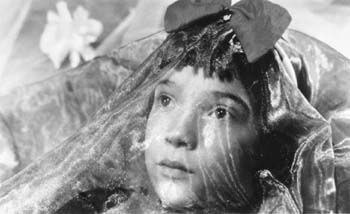
Jean-Claude Lother
Growing Up Is Hard to Do: Ludovic (Georges Du Fresne) wants to be a girl in 'Ma Vie en Rose.'
Belgian Ma Vie en Rose suggests a fantasy of American suburban life
WE CERTAINLY are getting some interesting movies from Belgium lately. These movies look into a milieu that's a mirror for American locales, movies that for attitude, prosperity and locations could be American--except nobody is bedeviled by religion and everyone is speaking French. (And like the last good movie from Belgium, La Promesse, here's a swatch of magical realism that doesn't always blend with the lives of an eminently practical people.)
Ma Vie en Rose is set in a suburb of Brussels; the Fabre family is coping with a problem that's worsening as the weeks go by. Seven-year-old Ludovic (Georges Du Fresne), one of four Fabre children, is convinced that he's actually a girl. He refuses to cut his hair and puts on a dress and makeup every chance he gets. The kids at school are calling him tapette (queer). In a demonstration of the hazards of living close to your boss, Ludovic has also made public his intention to marry Jerome, the neighbor kid, the son of his father's employer.
It's a slight story, but it has a look of its own. Director Alain Berliner shot it in a neighborhood that looks as if it had been dusted with eye shadow. Ludovic is enamored with a Barbie figure called Pam; she has a TV show on which she's a fairy princess who flies through the air, waving a wand that dispenses cotton-candy-colored sprinkles of pixie dust.
The sharp, clashing colors, the synthesized score and the big bursting flowers that look too perfect to be real growing in the mowed front yard all suggest a fantasy of American suburban life. (There's a line referring to a nearby America Street, and everything from minivans to baseball caps turns up on screen.) Amid the artifice, Ludovic's troubles are sharp and real; when he's forced to get his hair cut, you wince at all the little injustices done to children in the name of making them happier.
Similarly, Michèle Laroque as the mother, Hanna, gives the film some roots. Laroque is a blonde who looks like a prettier, more mirthful version of Amanda Plummer. The fox-faced Laroque is nobody's bottomless well of understanding, but she isn't a bitch-mother either. When the role of mommy is played in an American movie, whoever is cast is required to play it as if she were dead below the waist. (If there's a love scene in a family movie, it's a big fat joke; dad snores through mom's lingerie, or else the kid bounces into the bedroom before anything interesting can happen.)
Laroque looks like a woman who hasn't given up on the wilder side of life. When she has her revenge on her husband's boss, she gives him the devil sign as a kiss-off. More than Berliner's fairy dust and fantasy, it's Laroque's determination that tips us off that everything will come out right in the end. A mother like that isn't going to let the world push her son around.
Ma Vie en Rose (R; 88 min.), directed by Alain Berliner, written by Berliner and Chris Vander Stappen, photographed by Yves Delume and starring Georges Du Fresne and Michèle Laroque.
[ San Jose | Metroactive Central | Archives ]
![[Metroactive Movies]](/movies/gifs/movies468.gif)